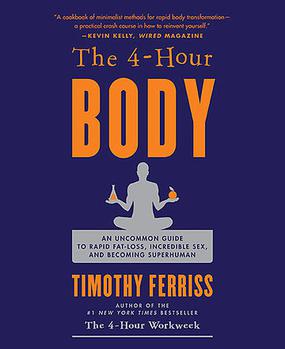The 4-Hour Body
(Redirected from Slow-Carb Diet)
The 4-Hour Body: An Uncommon Guide to Rapid Fat-Loss, Incredible Sex, and Becoming Superhuman is a book by Timothy Ferriss, published in 2010. The book covers a wide range of topics related to health, fitness, and lifestyle design, and it is a follow-up to Ferriss's previous book, The 4-Hour Workweek.
Overview[edit | edit source]
The book is divided into several sections, each focusing on different aspects of physical and mental well-being. Ferriss uses himself as a human guinea pig to test various theories and techniques, documenting his findings and providing actionable advice for readers.
Key Concepts[edit | edit source]
Slow-Carb Diet[edit | edit source]
One of the central themes of the book is the Slow-Carb Diet, which Ferriss claims can lead to rapid weight loss. The diet emphasizes the consumption of protein, legumes, and vegetables, while avoiding carbohydrates such as bread, pasta, and rice.
Occam's Protocol[edit | edit source]
Ferriss introduces Occam's Protocol, a minimalist approach to strength training designed to maximize muscle gain with minimal time investment. The protocol involves short, intense workouts performed twice a week.
The Minimum Effective Dose[edit | edit source]
The concept of the Minimum Effective Dose (MED) is a recurring theme in the book. Ferriss argues that most people can achieve their desired results with much less effort than they think, by focusing on the smallest dose that will produce the desired outcome.
Sleep and Recovery[edit | edit source]
Ferriss explores various techniques for improving sleep quality and enhancing recovery from physical exertion. He discusses the benefits of polyphasic sleep, cold therapy, and supplements such as magnesium and melatonin.
Sex and Relationships[edit | edit source]
The book also delves into topics related to sexual health and relationships. Ferriss provides tips for improving sexual performance and discusses the importance of emotional intimacy.
Reception[edit | edit source]
The 4-Hour Body received mixed reviews from critics. Some praised its practical advice and innovative approach, while others criticized it for lacking scientific rigor. Despite the mixed reviews, the book became a New York Times Best Seller and has a dedicated following.
See Also[edit | edit source]
References[edit | edit source]
External Links[edit | edit source]
Search WikiMD
Ad.Tired of being Overweight? Try W8MD's physician weight loss program.
Semaglutide (Ozempic / Wegovy and Tirzepatide (Mounjaro / Zepbound) available.
Advertise on WikiMD
|
WikiMD's Wellness Encyclopedia |
| Let Food Be Thy Medicine Medicine Thy Food - Hippocrates |
Translate this page: - East Asian
中文,
日本,
한국어,
South Asian
हिन्दी,
தமிழ்,
తెలుగు,
Urdu,
ಕನ್ನಡ,
Southeast Asian
Indonesian,
Vietnamese,
Thai,
မြန်မာဘာသာ,
বাংলা
European
español,
Deutsch,
français,
Greek,
português do Brasil,
polski,
română,
русский,
Nederlands,
norsk,
svenska,
suomi,
Italian
Middle Eastern & African
عربى,
Turkish,
Persian,
Hebrew,
Afrikaans,
isiZulu,
Kiswahili,
Other
Bulgarian,
Hungarian,
Czech,
Swedish,
മലയാളം,
मराठी,
ਪੰਜਾਬੀ,
ગુજરાતી,
Portuguese,
Ukrainian
Medical Disclaimer: WikiMD is not a substitute for professional medical advice. The information on WikiMD is provided as an information resource only, may be incorrect, outdated or misleading, and is not to be used or relied on for any diagnostic or treatment purposes. Please consult your health care provider before making any healthcare decisions or for guidance about a specific medical condition. WikiMD expressly disclaims responsibility, and shall have no liability, for any damages, loss, injury, or liability whatsoever suffered as a result of your reliance on the information contained in this site. By visiting this site you agree to the foregoing terms and conditions, which may from time to time be changed or supplemented by WikiMD. If you do not agree to the foregoing terms and conditions, you should not enter or use this site. See full disclaimer.
Credits:Most images are courtesy of Wikimedia commons, and templates, categories Wikipedia, licensed under CC BY SA or similar.
Contributors: Prab R. Tumpati, MD

